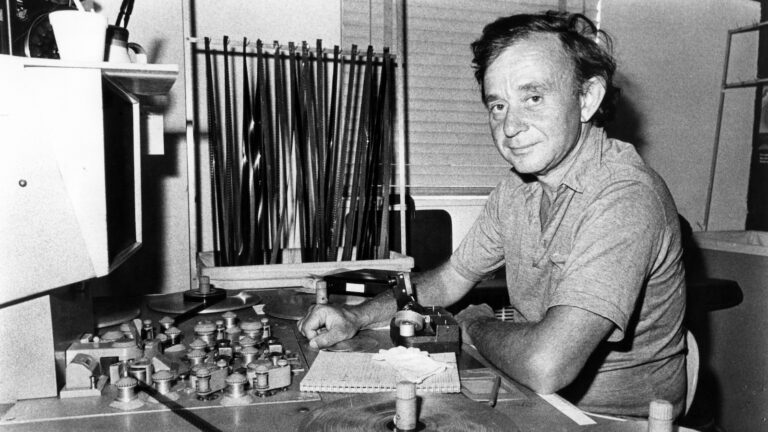Israeli director explores abuse
A young blind woman climbs into a cab, folds up her collapsible cane, and gives the driver directions. Curious about the woman, the driver asks her personal questions, including whether she has ever dated.
“Yes,” the woman says.
“Was he blind or normal?” the driver asks.
With a faint smile, the woman replies, “One was deaf and one was a dwarf. Is that normal?”
Occasionally tongue-in-cheek, but more often painfully serious, the Israeli film “Out of Sight” is a beautiful and poignant exploration of love, betrayal, and familial bonds, as experienced through the unique senses of a blind woman.
The film, which won the Best Director and Best Cinematography Prizes at the 2005 Israeli Academy Awards, was presented Monday in the Goldsmith Family Cinema, followed by a talk by the director, Daniel Syrkin, as part of the Contemporary Israeli Voices lecture series. Sponsored by Jewish and Israel Studies, the Department of Romance Languages and Literatures, and the Israeli Consulate of New York, the event provided insight into the world of a contemporary Israeli director exploring universal themes on a minimal budget.
“Out of Sight” starts with the story of Ya’ara (Tali Sharon), a blind woman who returns to Israel from the U.S. when she learns that her cousin and closest childhood friend, Talia, has committed suicide. Ya’ara, whose remembers Talia as vibrant and full of life, is determined to uncover the reason behind suicide. Through artful flashbacks (Ya’ara and Talia are played as children by Avigail Harari and Hadas Yaron), the film traces a slow path towards Ya’ara’s hard realization of the truth; Talia killed herself because she was sexually abused by her father.
During the filmmaking process, Syrkin tried to bring in as much outside knowledge as possible in order to realistically portray the central themes of blindness and sexual abuse in the movie. He met extensively with both blind and abused women in order to gain their perspectives.
The first time Syrkin met with the blind woman who would be his primary advisor on the film, he realized how well she understood the world through sound.
“We met in a big room and after she said ‘Hello’ she immediately commented on what a big room we were in,” Syrkin said. “She could hear the space.”
Fascinated by the heightening of hearing and touch that accompanies the loss of sight, Syrkin decided to minimize the film’s visuals into tight close-ups and concentrate on sound.
“It worked out because nice sound is cheaper than nice visuals,” Syrkin said.
The combination of close shots and dramatic sounds was especially effective in the scene where members of Talia’s extended family gather to mourn her death. Surrounded by relatives, whose faces appear uncomfortably near, Ya’ara focuses on an overwhelming hum of noises: the crunching of bread, the clinking of glasses, the murmur of curious and disapproving voices.
Though Syrkin decided not to cast a blind actress for either the young Ya’ara of the flashbacks or the present-day Ya’ara, the actresses he did choose were determined to convincingly portray the actions and mannerisms of a blind person. This included walking around blindfolded with a cane to give their performances further authenticity.
Exemplifying this resolve, Syrkin related a story about the actress playing young Ya’ara. When Hariri was last to the shoot one day, Syrkin began to worry. Eventually, however, a taxi pulled up, the driver ran around to open the back door. Out stepped the young actress, who had come all the way to work blindfolded.
“Out of Sight” is Syrkin’s first feature film. He generally works in television, and is currently making a series on Israeli politics.
When asked whether this film intentionally left out any references to the Israeli political situation, Syrkin defended the scope of creativity among Israeli filmmakers.
“Just because you live in Israel, you don’t need to make a film about the Holocaust or the Israeli-Palestinian conflict,” Syrkin said.
The film is political in its own way, especially in its criticism of domestic abuse. Both Talia’s mother and her uncle refuse to admit to themselves that Talia’s father has been sexually abusing both Talia and her sister. When Ya’ara discovers the family’s dark secret, she lashes out at everyone who allowed the abuse to continue. However, the issue of culpability in the film is not clean-cut. Each character feels responsible in some way.
Ya’ara’s discovery of this dark secret was emotionally and physically painful, even for the viewer.
“There were so many times when I wanted to cover my eyes,” said Kate Levy ’09. “I was so tense during the whole film.”
Syrkin is currently on a tour of American universities, screening and talking about the film. He has been happy with the American response, he said.
If the sniffling and gasps that emanated from the Wesleyan audience are any representation of the response of American university viewers in general, people have been powerfully affected by the story. Syrkin said that American audiences have not been significantly different from Israeli audiences in that respect.
“That means that the themes are universal enough to speak to anyone, regardless of nationality,” Syrkin said.







Leave a Reply